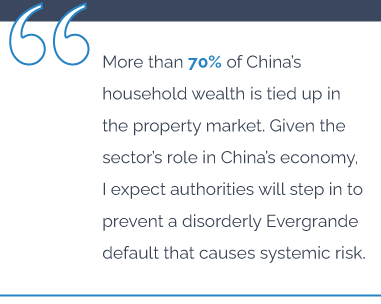Global GDP Themes and Forecasts
The disinflation trend appears intact in the US and in the euro area. While economic growth in these regions could ease, we believe solid...
The financial troubles of China Evergrande Group, China’s second-largest property developer, have put market participants on edge. Recently tightened financial restrictions have propelled the highly levered company into a liquidity crisis and it’s at risk of default. Given the company’s size, many investors are worried that its problems could lead to system-wide financial pain in China, with potential ripple effects across the global economy.
In my view, the situation is testing China’s balancing act between financial de-risking and preventing systemic financial risk. Remember, the Chinese government’s policy goal is to reduce leverage and mitigate risks to the financial system. On one hand, allowing Evergrande to suffer the consequences of its risk-taking behavior would send an important message to the market about curbing excessive debt and “moral hazards.” On the other hand, the size and interconnected nature of Evergrande’s debt means that a default could have potential knock-on effects throughout the economy. With the 20th Communist Party Congress just over a year away, I believe the government will move decisively to prevent a crisis and ensure growth remains on track in 2022.
Below, I share my thoughts on how China might handle this balancing act and what could go wrong.
In my opinion, the Chinese government does not view Evergrande as “too big to fail,” and a full government bailout is unlikely. However, I do think the government views the property sector as “too big to fail.” More than 70% of China’s household wealth is tied up in the property market.[i] Given the sector’s role in China’s economy, I expect authorities will step in to prevent a disorderly Evergrande default that causes systemic risk.

I think the most likely outcome for Evergrande is a controlled debt restructuring with some government intervention. In this scenario, authorities would establish a creditor committee to help extend the maturity of the company’s debt obligations, reduce lending rates and provide support to stave off default. They would also call in some state-owned enterprises (SOEs) to complete Evergrande’s construction projects to maintain homebuyer confidence. In my view, this approach would allow the government to strike a balance between instilling market discipline and containing systemic risk.
I see two key events that could trigger more systemic risk:
I believe so. With mass media coverage of Evergrande and an outlook for stagnant prices, I think new housing sales will slow. Sluggish housing sales could then erode prices at land sales auctions and undercut a major source of revenue for local authorities. Barring the worst-case scenario of a disorderly Evergrande default, I believe we are likely to see weaker demand growth in China for at least the next two quarters. I estimate fourth-quarter GDP at just above 4.5%. Under these circumstances, I believe the government could implement additional fiscal and monetary stimulus as soon as November or December.
The markets generally appear to be pricing in an orderly unwind of Evergrande’s debt obligations. As of this writing, downward pricing pressure has been largely confined to China’s property sector. I do not think the markets have priced in a growth slowdown in China or how that might affect the global economy.
With each day that passes, I believe the knock-on risks associated with Evergrande grow. Investors have begun re-pricing credit risks among other Chinese property developers, increasing the already-high refinancing pressure on leveraged firms. In my view, Chinese authorities should act soon with carefully crafted assistance to contain the situation.
The information in this article is provided for general information purposes only and does not take into account the investment objectives, financial situation or needs of any person. Investors Mutual Limited (AFSL 229988) is the issuer and Responsible Entity of the Loomis Sayles Global Equity Fund (‘Fund’). Loomis Sayles & Company, L.P. is the Investment Manager. This information should not be relied upon in determining whether to invest in the Fund and is not a recommendation to buy, sell or hold any financial product, security or other instrument. In deciding whether to acquire or continue to hold an investment in the Fund, an investor should consider the Fund’s Product Disclosure Statement, available on the website www.loomissayles.com.au or by contacting us on 1300 157 862. Past performance is not a reliable indicator of future performance. Investments in the Fund are not a deposit with, or other liability of, Investors Mutual Limited and are subject to investment risk, including possible delays in repayment and loss of income and principal invested. Investors Mutual Limited does not guarantee the performance of the Fund or any particular rate of return.
Register to receive regular performance updates and regular insights from the Loomis Sayles investment teams, featured in the Natixis Investment Managers Expert Collective newsletter.
Loomis Sayles marketing in Australia is distributed by Natixis Investment Managers, a related entity. Your subscriber details are being collected on behalf of Loomis, Sayles & Company, and Investors Mutual Limited (the RE for Fund) by Natixis Investment Managers Australia. Please refer to our Privacy Policy. Natixis Investment Managers Australia Pty Limited (ABN 60 088 786 289) (AFSL No. 246830) is authorised to provide financial services to wholesale clients and to provide only general financial product advice to retail clients.